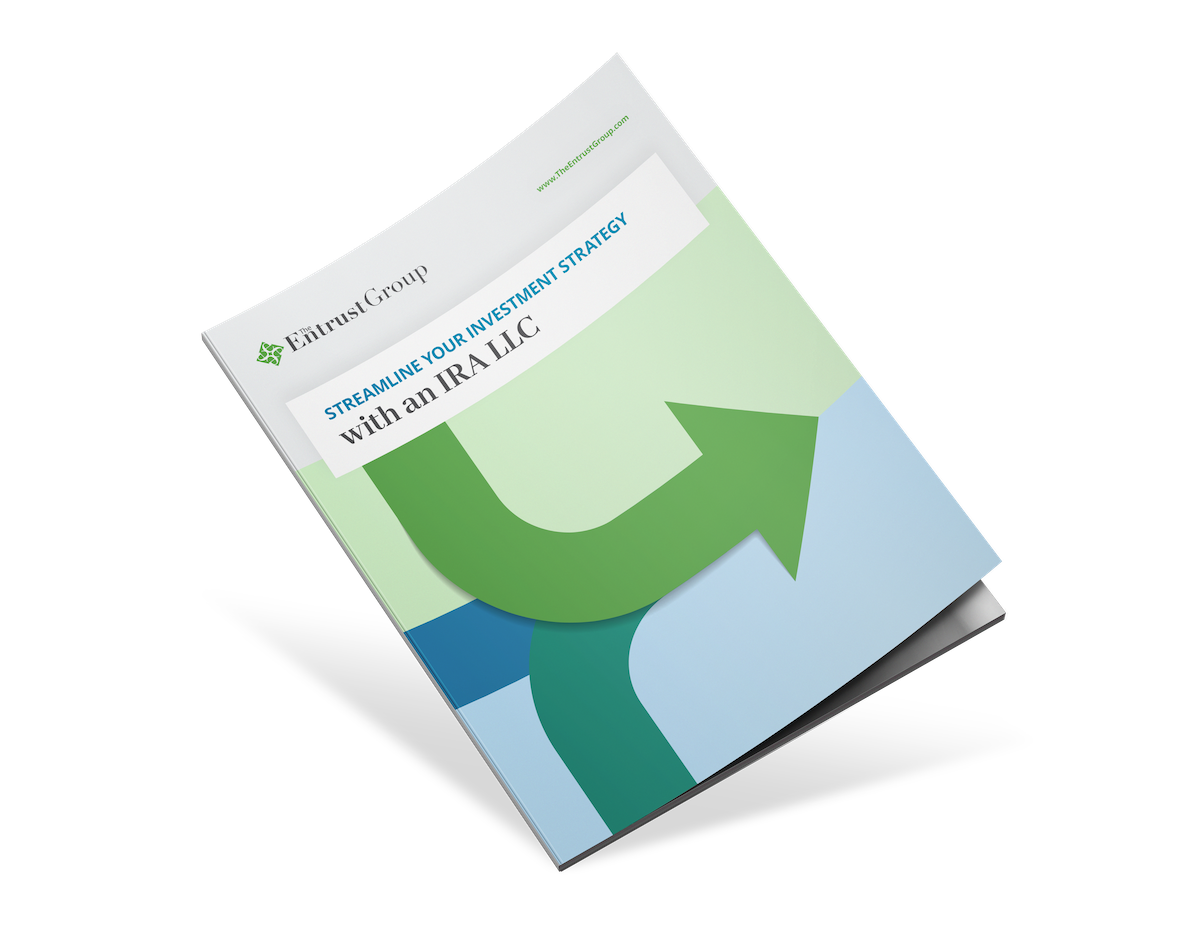Investing with a Self-Directed IRA Through an LLC in December 2025

Estimated Reading Time: 10 minutes
How to invest with a self-directed IRA (SDIRA) through a limited liability company (LLC) is one of the most popular questions we receive.
Investing your self-directed IRA through an LLC can grant faster transactions, simplified administration, and enhanced privacy. However, this strategy isn’t for everyone. In this post, we’ll learn how SDIRAs and LLCs can join forces to potentially streamline your alternative investment strategy.
_______________
KEY TAKEAWAYS
By setting up a self-directed IRA LLC, investors can gain greater control over their investments and make investment decisions quickly without requiring action from their SDIRA custodian.
- A self-directed IRA LLC may also provide asset protection for investors' retirement funds, as the LLC structure can help shield those funds from creditors or legal judgments.
However, setting up a self-directed IRA LLC can be complex and may require the help of an attorney or financial advisor to ensure compliance with IRS rules and regulations.
- Investors should carefully consider the potential risks and benefits of a self-directed IRA LLC before deciding whether it's the right investment vehicle for their needs.
_______________
Investing with an SDIRA through an LLC
When considering investing through an LLC, one word makes all the difference.
Some investors invest in an LLC with their SDIRA. This means that they invest the funds in their SDIRA in a business that is structured as an LLC. For instance, if your SDIRA owns shares in a local bike shop, your SDIRA has invested in an LLC.
Investing with an SDIRA through an LLC is a very different scenario. When an investor invests through an LLC, they create an LLC which is owned by the SDIRA. The LLC may then invest the SDIRA’s funds into alternative assets.
You may have heard these structures referred to as IRA LLCs or even Checkbook Control LLCs. Both of these terms simply refer to self-directed IRAs that invest through an LLC.
Many investors choose to invest with an SDIRA through an LLC for real estate, though this structure can work for all types of alternative assets.
3 Benefits of Investing Through an LLC
Investing through an LLC is an investment strategy that provides flexibility and several potential benefits for SDIRA holders.
- Checkbook Control: By establishing an LLC within your SDIRA, you gain what is known as checkbook control. Rather than waiting on your custodian to fulfill your request, you have direct control over the funds and can make investment decisions on behalf of the LLC. It allows for greater flexibility and quicker execution of investment opportunities. Keep in mind, this increased control means you should exercise even greater due diligence.
- Simplified Administration: By utilizing an LLC, you can consolidate the management and administration of multiple SDIRA investments under one entity. This can simplify recordkeeping, reporting, and tax filing requirements, as you can treat the LLC as a single entity. It may also lower your annual account maintenance fees.
- Privacy and Confidentiality: Investing through an LLC can offer increased privacy and confidentiality. When you invest directly as an individual, your personal information may become public in certain scenarios. By using an LLC, you can maintain privacy by conducting investments and transactions in the name of the LLC, keeping your personal identity separate.
Overview of Limited Liability Companies
A Limited Liability Company (LLC) is a US legal structure that combines the pass-through taxation of a partnership or sole proprietorship with the liability protection that comes with incorporation.
The hybrid structure of an LLC is more flexible than a corporation and there is much less recordkeeping and administration. LLCs are also subject to fewer regulations. In some cases, they are allowed to choose how they are taxed.
LLCs are also valued for their limited liability. This structure can shield owners from being personally liable for the company’s debts and obligations. In order to preserve the limited liability protection of an LLC, it is imperative that the LLC is set up properly. For instance, if the LLC and owner commingle funds, this could lead to disqualification of the tax-advantaged status of the IRA.
Establishing an LLC
Since LLCs must be established and registered in a state, it is important to know the rules for establishing an LLC in your state. In general, the procedure for getting started with an IRA LLC is fairly simple. Here’s an example of what it might look like:
- Choose a name for your LLC.
- Register your LLC with the state, and file your articles of organization. Be sure to check out your state’s unique requirements. Some states require a one-time establishment fee while others charge a recurring annual fee. For instance, an LLC based in California must pay an annual tax of $800.
- Apply for an Employer Identification Number (EIN) for the LLC. In some cases, the IRA holder applies for an EIN for their IRA which is also used to establish the LLC.
- Choose a registered agent that can be physically available to accept any legal paperwork. If you need to find a registered agent, you can always contact your secretary of state for a list of companies that provide this service.
- Only some states require an operating agreement to establish an LLC. However, it is important to have one in place if you are investing with an SDIRA through your LLC.
When an SDIRA invests through an LLC, the LLC must be set up so that the SDIRA owns 100% of the LLC. The SDIRA account holder cannot own the LLC. This would constitute a prohibited transaction and nullify the tax-advantaged status of the SDIRA. The SDIRA account holder is most often listed as the manager of the LLC.
Once the LLC is established, it may open a checking account managed by the SDIRA holder. This results in checkbook control, allowing the account holder to conduct transactions on behalf of the SDIRA.
It is important, however, to always remember that the SDIRA is the owner of the LLC. No income made from the investments in the LLC can be paid into your personal accounts, and all the expenses paid out for the investments in the LLC must be paid for by the SDIRA.
It’s a good idea to consult with legal counsel that is familiar with your state’s LLC laws and IRA rules. This can ensure that your documents are written with the proper provisions to avoid prohibited transactions.
Tax Considerations
Investing with an SDIRA through an LLC doesn’t provide any additional tax advantages, but there are tax rules to keep in mind.
Because an LLC is a pass-through or flow-through entity for taxation, the income passes through the LLC to the SDIRA. Since an SDIRA is a tax-deferred entity, there is no taxable event when the SDIRA purchases or sells an investment through the LLC.
However, some investments in an LLC may trigger unrelated business income tax (UBIT) or unrelated debt-financed income (UDFI).
There are several special circumstances that can result in UBIT, but it is most often triggered when an SDIRA generates trade or business income. UBIT does not apply to passive income generated from the investment such as rental income, interest, dividends rights, and royalties if the investment was purchased using only IRA funds.
UDFI may be triggered when your SDIRA’s investment is leveraged with debt, such as if a real estate property is financed with a non-recourse loan. In the event that UBIT or UDFI is required, as the owner of the LLC, your SDIRA may need to file a tax return for the IRA called the IRS Form 990-T.
LLC Investment Options
Just like SDIRAs, LLCs are allowed to invest in any alternative investment allowed by the IRS. Alternative investment options are practically endless and include everything from real estate to precious metals, private equity, and even food trucks. The only restricted investments per the IRS rules are collectibles, life insurance, and S-Corporations.

The rules for investing with your SDIRA through an LLC are the same as the rules for investing with an SDIRA. In order to preserve the tax-advantaged status of your SDIRA, it is imperative that you avoid prohibited transactions and dealings with disqualified persons.
Disqualified persons include the SDIRA owner, fiduciaries, lineal descendants or ascendants, or family members of the SDIRA owner, as well as some businesses or business partners. The disqualified person list is determined by the IRS, and it is important to pay close attention to the details of the list when transacting with your SDIRA.
Prohibited transactions are transactions between an IRA and a disqualified person that benefit the disqualified person. These transactions can include selling or leasing a property, providing credit or a loan, providing goods or services, or any other interaction or transfer of assets that benefit a disqualified person.
Don’t jeopardize the tax-advantaged status of your SDIRA. Instead, be a savvy investor. Learn the rules inside and out and consult with your legal and financial advisors.
Investing with Your SDIRA through an LLC at Entrust
At Entrust, you can begin investing with your SDIRA through an LLC as soon as you have established and funded all the necessary accounts.
- After you open your SDIRA at Entrust, you will need to fund your IRA with a contribution, transfer, or rollover.
- Establish your LLC with a reliable provider. Once that’s completed, your LLC can open a checking account.
- Send Entrust the operating agreement of your newly formed LLC with the SDIRA listed as the sole owner.
- You will also need to submit an investment request in order to fund the LLC checking account. You can complete this step through the Entrust Client Portal or through the Entrust mobile app.
- As the administrator of your SDIRA, Entrust will issue a check in the name of your SDIRA.
- These funds will go into your checking account and allow the SDIRA to begin purchasing assets through the LLC.
At Entrust, we make self-direction accessible, whether you opt for an IRA LLC or not.
Ready to learn the ropes? Dive into our SDIRA Rules Guide
Self-Directed IRA LLC FAQs
1. What is a Self-Directed IRA LLC?
A self-directed IRA (SDIRA) LLC is an investment strategy that allows SDIRA holders to invest in alternative assets via a pass-through entity, the LLC, owned by the SDIRA.
Often SDIRA investors will use this structure to purchase real estate or cut down on transaction fees when holding multiple assets. This structure grants SDIRA holders checkbook control, allowing the account holder to complete faster transactions. Instead of waiting on the SDIRA administrator to issue a check, the manager of the LLC (the IRA holder) may write checks on their own.
2. What is Checkbook Control?
Checkbook control is the term used when a self-directed IRA owner has complete signing authority over an account that gives access to his/her retirement funds. This strategy is achieved through the establishment of an IRA LLC.
3. What Can My SDIRA Invest in Through an LLC?
An SDIRA LLC can hold any alternative investment allowed by the IRS. The options for alternative investments are almost unlimited, but the IRS prohibits collectibles, life insurance, and S corporations.
4. Can Entrust Establish My LLC?
No, we do not establish LLCs for our clients. However, if you’re interested in an SDIRA LLC, we recommend consulting with financial and legal professionals that are familiar with LLC state laws and IRA rules. This will ensure that your LLC documents are written with provisions to avoid prohibited transactions and keep your tax-advantaged funds in good standing with the IRS.
5. How Do You Invest Through an LLC With an SDIRA?
In short, you need to establish a new LLC owned 100% by your SDIRA. As the SDIRA account holder, you can be listed as the manager of the LLC.
The LLC then opens a checking account. Once Entrust has received your LLC’s operating agreement and your SDIRA is funded, we can issue a check from the SDIRA to the LLC’s checking account. Once the LLC checking account is funded, the LLC can begin investing.

Explore Self-Directed IRA LLCs with Entrust
If you’re seeking more control, flexibility, and asset protection over your retirement funds, then an SDIRA LLC could be an ideal investment vehicle.
However, it's important to note that investing through an LLC can also involve additional costs and tax considerations. It's essential to consult with a knowledgeable tax advisor or financial professional who can guide you through the specific requirements and implications based on your unique situation and jurisdiction.
Want to learn more about IRA LLCs from an LLC expert? Watch a replay of our recent webinar, Investing With IRA LLCs: Is Checkbook Control Right for You? We were joined by Jay Butler, Managing Director at Asset Protection Services of America. In the session, you will learn:
- The unique advantages that make LLCs valuable for IRAs.
- Potential risks that are unique to investing with an LLC.
- Permitted investment options and associated regulations to avoid penalties.
If you’re unsure of whether an IRA LLC is right for you, talk with one of our SDIRA experts. Or if you’re ready to get started on your self-directed journey, open an account with The Entrust Group. We have over 22,000 clients and 40 years of experience in empowering investors to reach their financial goals, and we’re just getting started.













/Blog_Image_401k-executive-order_1000x500.jpeg?width=105&height=105&name=Blog_Image_401k-executive-order_1000x500.jpeg)

















14 Comments